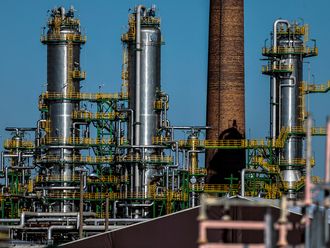Dubai For expatriate Indians looking to build a property portfolio in India, there is more to it than buying a second or a third home that can then be placed on the rental market. How about putting up that money – and then some - on an optimum sized office block or retail outlets that could generate consistent yields for the investor?
More NRI investors are thinking along the same lines, and this trend is particularly visible in cities spanning Tier A and Tier B categories. (Mind you, it is less evident in India’s metropolises where plots and commercial properties carry exorbitant price tags and thus accessible only to select investors.)
“As there are no restrictions on NRIs while investing in commercial and residential assets in India, they do have a variety of lucrative and balanced investment options,” said Anshuman Magazine, Chairman and Managing Director at the real estate consultancy CBRE’s South Asia operations based in Delhi.
“Investors have tried to broaden their investment base and hedge against market risks in residential property by investing in other assets such as commercial, mixed-use and land. We expect investors to maintain a balanced view on the market and continue to opt for both residential and commercial (especially leased assets).
“Property values in the office and retail segments in most markets are stable, while few markets have witnessed a decline. This is largely due to muted demand levels caused by the present economic slowdown. We expect values to consolidate and the market situation to improve in the next few months.”
This is the very same sentiment that S. K., an Abu Dhabi based tech professional, is working to put into reality. He is developing a three-storey office and retail block in the southern Indian city of Kochi, for an estimated cost of Rs22 million. And the way he went about financing it was first getting a personal loan from a UAE bank and then selling some of the jewellery holdings the family had.
“It was important to me that I should not be burdened with too much of a debt from the bank, which is why 40 per cent of the financing was through equity,” said S. K. “The project will be completed in two years and I have already managed to lease 30 per cent of the premises. It also helped that the plot was part of my inheritance and I did not have to pay for it.
“For most NRI investors property investments back home has to do with building a second home or going for an apartment. But commercial developments are going to be the future.”
That the rupee was sticking to a weak line against the dollar for more than 12 months now has been another plus for the GCC-based Indian expatriate.
According to a survey by Sumansa Exhibitions, 89 per cent of NRIs based in the UAE would consider investing in property valued at Rs10 million and more as a consequence of the weakened rupee. It also shows that 26.7 per cent of NRIs would buy property as additional investment, which is 6 per cent higher than the views expressed last year. The survey polled 16,000 NRIs based here.
“Bank deposits have also started yielding good returns making that a good investment alternative; however properties continue to be a preferred choice for expat Indians for investment and asset creation,” said a spokesperson for Indiabulls, a developer with an extensive coverage of projects across the country.
According to industry sources, the rupee’s current positioning vis-à-vis the dollar could generate average returns of 25 to 30 per cent over the next two to three years.
While real estate demand within India has slipped considerably in recent quarters, it could well be that expatriate Indians are riding in to the rescue. A soft rupee will only help add to their numbers.
BREAKOUT
India’s developer community is going through a testing phase. A stalling economy has burdened them with indifferent sales and rising debt pay-offs.
“Generally, developers are reeling under the ongoing funding crunch as well as challenges such as the retrospective VAT edict by the state government in Maharashtra,” said Anuj Puri, Chairman and Country Head at Jones Lang LaSalle India, the real estate services firm.
“Their ability to launch new projects as well as available funding for marketing of existing projects is compromised. At the same time, they are either unable or unwilling to reduce prices in ready-for-possession projects.
“This is either because they are confident of future sales at the existing price points or because astronomical land rates, increased input costs and the losses resulting from regulatory delays would seriously compromise profit margins if they reduce prices.”
If developers stick to their asking prices, it would only serve to put off buyers from getting into the market now. Then it comes down to who will blink first. It is not uncommon for developers to pare down values to be in line with market sentiments. In mid-2009 when the market was going through a similar phase, some of the leading names did do so at even their prestige projects.
It remains to be seen whether developers will make a repeat call now. NRI investors will be hoping they would.
“The first wave of NRI investor interest in real estate, brought on by the depreciated rupee and partly by the festive season, has come and gone,” said Puri.
“Also, those NRIs who had to return to India because of the worsening job situation abroad have already done so. Those that remain abroad tend to be in secure, high-paying jobs, so repatriation is not high on their priority list.
“There is still interest by NRIs, but the second investment wave is even more selective than the first.












